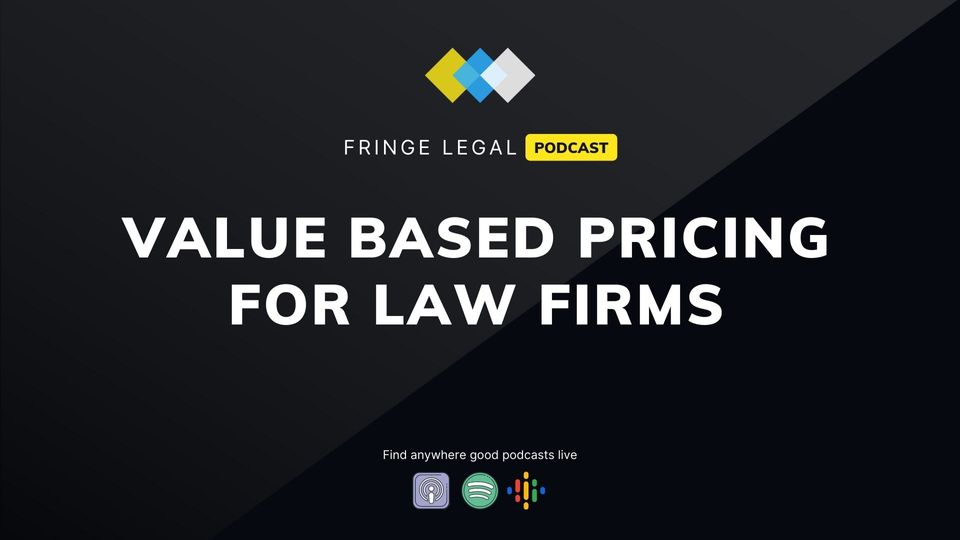Value based pricing for law firms with Keith Maziarek

Lawyers and firms have long struggled to find the right way to price their services.
The hourly billing model focuses on the amount of time spent on a matter, project, or case. This can often lead to inefficiencies and frustration for the lawyer and the client. Value based pricing is an alternative that takes into account the value of the service being provided rather than simply the time spent. It means that lawyers and firms are paid based on the results they achieve for their clients.
The incentive becomes focused on getting better results. Value-based pricing can also help build trust and improve communication between lawyers and clients.
However, that doesn't make pricing or pricing conversations any easier. In this episode, we go into the rabbit hole of pricing.
Special thanks to Paul Stroka of LexFusion for making the introduction to Keith.
Episode content
- Introduction and summary ➡ 1.24
- Power of buyer ➡ 4.30
- Power of supplier ➡ 7.34
- Elastic economic market ➡ 9.42
- Price discrimination ➡ 13.14
- Client sophistication ➡ 17.08
- Inflation and pricing for specialized services ➡ 23.46
- The next service delivery model ➡ 31.04
Here are some of our favorite takeaways from the episode (edited to be reading-friendly).
Value of work
One of the things that get ignored in discussions with clients or in the clients' calculus and how they determine what they're getting for the bills they're paying is that there's never a very accurate way of measuring the value that was captured from the services, and what the outcome was.
It's always what was that bill? That bill is high. Maybe you bought a company, in an M&A scenario, that had subsidiaries or locations in highly regulated, highly risky territories - where there's a ton more work to be done. It's not an apples-to-apples kind of company. So you don't look at what I got for the price I paid? You're just saying the bills are higher now.
Price discrimination
Ab: How do you demonstrate that we're going to charge you X, and it's worth more than X to you as an outcome?
Keith: Price discrimination is the short answer to that. Not everything is worth the same amount. By nature, and this is not any judgment or me trying to take a position on the actual value or the value of the practitioners doing this kind of work. But by nature, there's a spectrum of complexity, and the stuff that's really complex on the highly complex side tends to be more scarce. There is a more scarce supply of people who can do it.
On the opposite side, on a more commoditized side or the more routine side - it's not as complex, and there are more options to avail yourself of to do that work.
Client sophistication - apply the scalpel, not the hatchet
My particular role is to ensure that the firm is as profitable as possible and that we're making our clients as happy as possible in terms of service delivery models and getting the outcomes they want.
The conversation with the client depends on the level of sophistication:
I'd say architecting and implementing some of those solutions depends on the sophistication that the client or the person on the buy-side has. There are only so many levers in this business in terms of what I can do. It's all about service delivery models and the underlying economics. This isn't astrophysics. There are not huge, massively complex data jobs in most cases (there are some benefits to that in different scenarios).
There are a couple of levers on who's going to do the work and how much they have to do, what's the cheapest way to do it, and what the outcome will be. How do those things correlate (the price to the product)? Having those conversations with people that understand that better is important.
I've worked with several legal operations groups where they have the knowledge, the understanding, and the sophistication. Still, there's a gap in the level of influence they have over the in-house attorneys...
Different sides of the table, same challenges:
We have very similar challenges - in-house and the law firm side - as it relates to getting the lawyers to understand the economics, the process, and to engage attorneys with it - to really adopt it. As opposed to, 'Yeah, but I'm skeptical of that because I don't understand it. So let's just do it the old way.'
Next service delivery model
Where can I get efficiencies out of technology? Which is a hugely growing market, that's going to be the new paradigm shift. It's going to be a much more dynamic service delivery model...
Given that we've got a shortage of supply of people with the requisite skills to do a lot of this work and that's why we have to charge more. They [the attorneys] also have been working ridiculous man hours, and that's why we have to pay more for that. On top of that, there are obviously the mental health and quality of life concerns which is why a lot of people leave the workforce.
I've been trying to make the case, and we work with our innovation group a lot, too, with several different teams internally to say: 'if you don't want people burnt out, you want them to have a better level of work-life balance and job satisfaction. Don't force them to brute force their way through everything all the time.'
If you can get 30% more productivity out of the same people and let them sign off at seven or eight at night and use some tool that scales their productivity and delivers efficiencies then do it. You still get the same outcome, you just don't have to have as much input to have the same output.
Resources mentioned
- Off The Clock Podcast
- Porter's Five Forces and a deeper look at Buyer Power
- 🎧 Janet Stanton – Benefits of a Strategic Client Management Program
- 🎧 Rasmeet Charya – Using technology to maximize the value of legal services
- Smart collaboration for lawyers and law firms with Dr. Heidi Gardner
About Keith Maziarek
Keith Maziarek has been building and leading legal services pricing/legal project management/profitability functions since 2009. He is currently Director of Pricing and Legal Project Management at Katten Muchin Rosenman LLP, where he is responsible for building and scaling the firm’s formal pricing and legal project management functions. Prior to Katten, Keith served as Senior Director of Client Value for Perkins Coie LLP, working closely with the client legal operations executives to develop collaboration strategies to improve operational efficiencies. Keith’s career in strategic pricing began at DLA Piper LLP, where he built the firm’s strategic pricing, profitability and legal project management functions as the firm’s first Head of Strategic Pricing. He previously worked in strategic business development, helping establish a deep understanding of clients’ business needs.
Keith is a Board Member and Officer of Legal Value Network, a legal operations, pricing/project management and process improvement industry group focused on evolving the legal service delivery model. He frequently speaks at industry events and publishes articles on related topics. Keith earned his M.B.A. from the Kellogg School of Management at Northwestern University and a B.S. in Business Management from the University of Illinois-Chicago.






Become a Fringe Legal member
Sign in or become a Fringe Legal member to read and leave comments.
Just enter your email below to get a log in link.